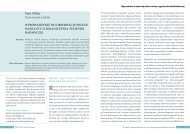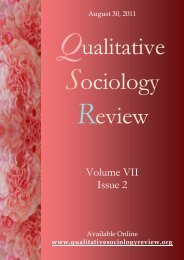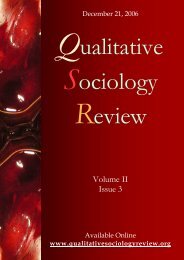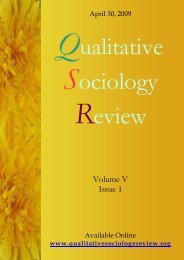Gillies, V. and Edwards, R. - Qualitative Sociology Review
Gillies, V. and Edwards, R. - Qualitative Sociology Review
Gillies, V. and Edwards, R. - Qualitative Sociology Review
You also want an ePaper? Increase the reach of your titles
YUMPU automatically turns print PDFs into web optimized ePapers that Google loves.
urden on those dependent upon it for survival. This essential mutual support<br />
conveys none of the wider economic benefits discussed by Bourdieu. Consequently<br />
while Coleman disregards the potentially onerous nature of social capital, Bourdieu’s<br />
linking of social capital to personal gain appears to overlook the crucial role of social<br />
solidarity as a day to day resource.<br />
Social capital <strong>and</strong> the gender gap<br />
Despite a broader tendency in the mainstream theoretical literature to discuss<br />
social capital as a gender neutral concept, our study highlights how, at the level of<br />
family, it is predominantly managed <strong>and</strong> maintained by women. In line with previous<br />
research (Moore, 1990) we found men’s networks to be more formal <strong>and</strong> less kin<br />
based, while women’s networks were less formal <strong>and</strong> contained more family<br />
members. It was mothers rather than fathers who sustained family links, negotiated<br />
childcare arrangements <strong>and</strong> organised social activities. Generally speaking, the<br />
women in our sample had more intimate friendship networks compared with their<br />
partners, <strong>and</strong> appeared to place greater value on friends. Also it was mothers rather<br />
than fathers who made links with <strong>and</strong> sustained regular contact with other parents<br />
(mostly other mothers) in their locality.<br />
From Coleman’s essentially normative perspective, social capital depends upon<br />
a traditional gender division with men acting as breadwinners while women remain at<br />
home to care for the children. Consequently the central role that mothers play in<br />
negotiating social capital is viewed as natural <strong>and</strong> normal, but under threat from<br />
greater equality <strong>and</strong> opportunity for women. As Maxine Molyneux (2002) notes,<br />
mainstream social capital theories often present women as instinctively predisposed<br />
to community <strong>and</strong> family relationships, while rarely questioning their absence in more<br />
powerful male dominated networks. As a result, women are viewed either as<br />
potential social capital saviours <strong>and</strong> targeted to undertake unpaid voluntary or<br />
community work, or they are held responsible for its perceived demise. Colman’s<br />
concerns about the increase of women in the workforce can appear reactionary <strong>and</strong><br />
dated, yet his theories resonate with widely held anxieties about the stability of the<br />
family <strong>and</strong> society. Fears that a detraditionalisation <strong>and</strong> individualisation of social life<br />
will lead to the breakdown of society have driven the attempt to harness social capital<br />
theory as a policy remedy (e.g. Halpern, 2004). Yet as we have stated, our analysis<br />
provides no indication that families are disconnected or isolated. Instead, the<br />
dominance of women in managing <strong>and</strong> mediating social capital illustrates how<br />
mothers continue to shoulder primary responsibilities for family life whether or not<br />
they work outside of the home.<br />
In this context, Bourdieu’s theory offers a more useful way of underst<strong>and</strong>ing this<br />
social capital gender imbalance. Gender for Bourdieu is a primary symbolic<br />
classification in a wider social framework based upon power <strong>and</strong> distinction. While<br />
his work most effectively draws out the classed nature of social <strong>and</strong> other capitals,<br />
numerous feminists have found this model can be appropriated to explore gender<br />
differences (Lawler, 2000; Lovell, 2000; Reay, 1996, 1997; Skeggs, 1997). More<br />
specifically, Bourdieu suggests that the various forms of capitals accessed by<br />
individuals shape their particular ”habitus”, or way of being <strong>and</strong> doing. According to<br />
Bourdieu (1979,1990), habitus is acquired not through conscious learning or as the<br />
result of ideological coercion, but through lived practice, <strong>and</strong> is deeply ingrained in<br />
material dispositions such as walking <strong>and</strong> talking, as well as thinking <strong>and</strong> feeling.<br />
This practical habituation is described by Bourdieu as a ”second sense” or a ”feel for<br />
the game”. It is through a combination of experience, practice <strong>and</strong> reflection that<br />
©2006 QSR Volume II Issue 2 www.qualitativesociologyreview.org 50
















